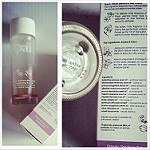When we hear the words “natural”, “organic” and “green” we automatically believe this means something is good for us because it comes from nature, compared to a product that is advertised as “synthetic” or containing “chemical” ingredients. But the truth is, not all products advertised as natural are necessarily good for you, and not all synthetic and chemical products are bad for you… especially when it comes to talking about skincare!

Face Mask Application Source: Flickr Commons
What’s the difference?
One of the main differences between products advertised as “organic” and “synthetic” is that many of the ingredients that are made up from organic molecules in these products are much bigger due to the structure of the molecule and they tend to be less refined. This can be bad because the ingredients then sit on top of your skin and can cause irritation. Whereas in synthetic ingredients, the molecules tend to be smaller and more refined so they can easily absorb into your skin. However, the synthetic products that are more easily absorbed into your skin are only any better than the organic products if they don’t irritate your own skin, but this can vary from person to person. Still, the synthetic ingredients overall have less of a chance of irritating your skin because it can absorb.
In order to decide what kind of products are good or bad for your skin regardless of what they are advertised as, you should always look at the ingredients list to discover the truth of what is in these products. For example, a lot of “organic” skin care products contain essential oils, which may be pleasant to smell but it can actually really irritate your skin as with many fragrances in skin care- these molecules are quite large as well.

Aloe Plant, a common ingredient found in Skincare products Source: Flickr Commons
A recent study was done investigating two forms of sunscreen – a chemical based synthetic sunscreen and an organic physical block. Researchers compared the two and found that the chemical sunscreen absorbed better into skin and people experienced less irritation compared to the organic physical block sunscreen where dermatitis (inflammation of the skin) was common.
So what should you use?
It’s true that some natural and organic skincare products can be harmful for your skin especially if you’re not aware of what ingredients are contained in the product, but the same is true for synthetic. I believe that synthetic products are a safer option for your skin due to the easy absorption. At the end of the day regardless of what the product is marketed as I will always be reading the ingredient list to determine what products are best for my skin and I suggest you do the same as well!

Ingredients List for skincare product Source: Flickr Commons
If you’re curious as to what are some examples of common irritants are in skincare, check out this blog post by skin care specialist and author Paula Beguon.
-Morgan Strohan

2 responses to “Products marketed as “Organic” vs “Synthetic”… What is truly better for your skin?”